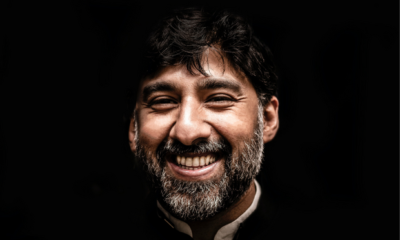Life
What Successful Life Leaders Do to Build a Deeply Fulfilling Life

Picture this: Two dudes, each on a horse, in a huge field. At the same time, each horse starts moving. That’s where the similarities end.
Dude #1 is holding on for dear life. He looks terrified and is bouncing around like he’s on a pogo stick instead of a horse. Basically, he happens to be there while the horse is doing whatever it darn well pleases. It prances, bucks, gallops, walks, spins around, runs in wide arcs. Through it all, the feller is off-balance, barely breathing, occasionally uttering a yell or expletive, and hoping for it all to calm down so he can catch his breath before the next rampage.
Dude #2, however, is a whole different story. His horse is moving under its own significant power, of course, but our guy is guiding it, encouraging it first one way, then another. He’s slowing it down when it wants to bolt ahead, and communicating firmly what he wants. Through it all, he sits tall in the saddle, holds the reins in a way that allows him the clearest communication with his ride.
Got the metaphor?
Your life is like the horses. It moves of its own volition, under its own steam. There are external factors and lots of unknowns that create circumstances beyond your total control. But the way you show up to your experience of life will make all the difference in your “ride.” You can feel like a victim of life’s twists, turns, and bucks, or you can learn how to ride and respond. Doesn’t mean you (I, we) won’t occasionally fall off or lose control, but it does ensure your ride will be a much, much more fulfilling experience.
Following are some of the most fundamental mindsets and practices successful life leaders put into place as they take the reins, improve their skills, and learn how to ride this thing called life!
1. Know They are ALWAYS at Choice
What’s that? You’re a human being in the world? Welcome to the club! Membership means you will, for sure, be judged, impacted by circumstances, and swept off your feet with awe. You’ll be loved, dumped, and loved again. You’ll have to hear (and say), “No.” You’ll hear (and say), “YES!” You’ll suffer disappointment, staggering grief, and moments of complete clarity…possibly followed by totally engulfing confusion. The world will surprise, delight, and throw you. And through it all, you are at choice.
2. Take RESPONSIBILITY for their Lives
It follows from the above that if we are fully at choice in our lives, we then hang out and take responsibility for what our choices create. The alternative? Being at choice (yay!), not liking or feeling good about the outcome (boo!), and sliding into “victim” mode, pointing the finger of blame at someone or something (mega BOO). The biggest problem with that (aside from the guarantee it’s going to create some seriously negative juju in relationships and the ethers of the world, and the world has plenty, right?!) is in how completely disempowering it is.
When we shirk responsibility for what we’re creating through our choices, it’s like we’re standing tall and then with one exceedingly long and muscular arm, we pull the rug out from under ourselves, then yell at someone else (or the breeze) about it.
“The secret to a fulfilled life is not only to do well but also to do good.” – Tony Robbins
3. Believe Their INNER FOUNDATION is Everything, and Act Like It
If you’ve got no roots, your tree’s gonna fall when the first wind blows. What grows deep, strong, far-reaching roots? Daily doses of sunlight, nutrients, water. And yeah, yeah…I know that you can see by the rings that trees go through stressed, lean years and healthy, full years, and they survive. But if trees had a choice (ahem, see #1 above), you can bet they’d keep up a steady dose of what’s going to help them thrive continuously.
The most sustainably successful life leaders I know are people who fully and consistently exercise their power of choice when it comes to creating a strong, deep foundation of self-care they can rely on…and in so doing, they learn they can rely on themselves. The thing is, this one isn’t rocket science. By now, *we know* the value of even short bits of meditation, prayer, or whatever stillness practice jives with each individual. We know that tending our most important relationships can make, well, just about every single thing better.
4. Get a Handle on Their FEAR
Fear gets a bad rap. Seems like everywhere we turn, we’re being called to “be fearless!” and kick our fear to the curb. Thing is, fear is one of THE core emotions we’re hardwired for, and we need it. Though we might not be running from actual tigers, our fear plays an incredibly key role in keeping us from entering unsafe situations and in helping us know when it’s time to vamoose when a situation becomes unsafe, emotionally or physically.
Enter life leadership, where we practice and practice and practice creating a conscious relationship with our fear, managing it down to size, seating our most empowered selves behind the wheel of our lives, and gleaning the wisdom this primal part of us has to offer…while moving forward.
5. Know That IF NOTHING CHANGES, NOTHING CHANGES
Does all this make sense in yer noggin, yah? And…when it comes down to it, ya gotta do the work.Life leaders zero in on what’s most important, they figure out why it’s worth it, and they take responsibility (cough-cough…#2 above) for getting the support and accountability they need to start making shifts in a more empowered.
HERE’S PERHAPS THE MOST IMPORTANT PART OF ALL OF THIS: If what you just read *doesn’t* describe you, but you *want* it to, take heart! Any of us out here doing this life leadership work started right where you are. We’re no different, we’re not special (though, c’mon, we’re all pretty damn fabulous in our own ways), and it’s totally doable. You’ve got this, and you’re so worth it!
Did You Know
How Skilled Migrants Are Building Successful Careers After Moving Countries
Behind every successful skilled migrant career is a mix of resilience, strategy, and navigating systems built for locals.

Moving to a new country for work is exciting, but it can also be unnerving. Skilled migrants leave behind familiar systems, networks, and support to pursue better job opportunities and a better future for their families. (more…)
Life
10 Research-Backed Steps to Create Real Change This New Year
This New Year could finally be the one where you break old patterns and create real, lasting change.

Every New Year, we make plans and set goals, but often repeat old patterns. (more…)
Life
9 Harsh Truths Every Young Man Must Face to Succeed in the Modern World
Before chasing success, every young man needs to face these 9 brutal realities shaping masculinity in the modern world.

Many young men today quietly battle depression, loneliness, and a sense of confusion about who they’re meant to be.
Some blame the lack of deep friendships or romantic relationships. Others feel lost in a digital world that often labels traditional masculinity as “toxic.”
But the truth is this: becoming a man in the modern age takes more than just surviving. It takes resilience, direction, and a willingness to grow even when no one’s watching.
Success doesn’t arrive by accident or luck. It’s built on discipline, sacrifice, and consistency.
Here are 9 harsh truths every young man should know if he wants to thrive, not just survive, in the digital age.
1. Never Use Your Illness as an Excuse
As Dr. Jordan B. Peterson often says, successful people don’t complain; they act.
Your illness, hardship, or struggle shouldn’t define your limits; it should define your motivation. Rest when you must, but always get back up and keep building your dreams. Motivation doesn’t appear magically. It comes after you take action.
Here are five key lessons I’ve learned from Dr. Peterson:
-
Learn to write clearly; clarity of thought makes you dangerous.
-
Read quality literature in your free time.
-
Nurture a strong relationship with your family.
-
Share your ideas publicly; your voice matters.
-
Become a “monster”, powerful, but disciplined enough to control it.
The best leaders and thinkers are grounded. They welcome criticism, adapt quickly, and keep moving forward no matter what.
2. You Can’t Please Everyone And That’s Okay
You don’t need a crowd of people to feel fulfilled. You need a few friends who genuinely accept you for who you are.
If your circle doesn’t bring out your best, it’s okay to walk away. Solitude can be a powerful teacher. It gives you space to understand what you truly want from life. Remember, successful men aren’t people-pleasers; they’re purpose-driven.
3. You Can Control the Process, Not the Outcome
Especially in creative work, writing, business, or content creation, you control effort, not results.
You might publish two articles a day, but you can’t dictate which one will go viral. Focus on mastery, not metrics. Many great writers toiled for years in obscurity before anyone noticed them. Rejection, criticism, and indifference are all part of the path.
The best creators focus on storytelling, not applause.
4. Rejection Is Never Personal
Rejection doesn’t mean you’re unworthy. It simply means your offer, idea, or timing didn’t align.
Every successful person has faced rejection repeatedly. What separates them is persistence and perspective. They see rejection as feedback, not failure. The faster you learn that truth, the faster you’ll grow.
5. Women Value Comfort and Security
Understanding women requires maturity and empathy.
Through books, lectures, and personal growth, I’ve learned that most women desire a man who is grounded, intelligent, confident, emotionally stable, and consistent. Some want humor, others intellect, but nearly all want to feel safe and supported.
Instead of chasing attention, work on self-improvement. Build competence and confidence, and the rest will follow naturally.
6. There’s No Such Thing as Failure, Only Lessons
A powerful lesson from Neuro-Linguistic Programming: failure only exists when you stop trying.
Every mistake brings data. Every setback builds wisdom. The most successful men aren’t fearless. They’ve simply learned to act despite fear.
Be proud of your scars. They’re proof you were brave enough to try.
7. Public Speaking Is an Art Form
Public speaking is one of the most valuable and underrated skills a man can master.
It’s not about perfection; it’s about connection. The best speakers tell stories, inspire confidence, and make people feel seen. They research deeply, speak honestly, and practice relentlessly.
If you can speak well, you can lead, sell, teach, and inspire. Start small, practice at work, in class, or even in front of a mirror, and watch your confidence skyrocket.
8. Teaching Is Leadership in Disguise
Great teachers are not just knowledgeable. They’re brave, compassionate, and disciplined.
Teaching forces you to articulate what you know, and in doing so, you master it at a deeper level. Whether you’re mentoring a peer, leading a team, or sharing insights online, teaching refines your purpose.
Lifelong learners become lifelong leaders.
9. Study Human Nature to Achieve Your Dreams
One of the toughest lessons to accept: most people are self-interested.
That’s not cynicism, it’s human nature. Understanding this helps you navigate relationships, business, and communication more effectively.
Everyone has a darker side, but successful people learn to channel theirs productively into discipline, creativity, and drive.
Psychology isn’t just theory; it’s a toolkit. Learn how people think, act, and decide, and you’ll know how to lead them, influence them, and even understand yourself better.
Final Thoughts
The digital age offers endless opportunities, but only to those who are willing to take responsibility, confront discomfort, and keep improving.
Becoming a man today means embracing the hard truths most avoid.
Because at the end of the day, success isn’t about luck. It’s about who you become when life tests you the most.
Change Your Mindset
The Four Types of Happiness: Which One Are You Living In?
Most people chase success only to find emptiness, this model reveals why true happiness lies somewhere else.

In a world driven by rapid technological growth and constant competition, many people unknowingly trade joy for achievement. (more…)
-

 News2 weeks ago
News2 weeks agoBrandon Willington Builds 7-Figure Business by Ignoring Almost Everything
-

 Health & Fitness3 weeks ago
Health & Fitness3 weeks agoWhat Minimalism Actually Means for Your Wellness Choices
-

 Did You Know2 weeks ago
Did You Know2 weeks agoWhy Most Online Courses Fail and How to Fix Them
-

 Business3 weeks ago
Business3 weeks agoIf Your Business Internet Keeps Letting You Down, Read This
-

 Business1 week ago
Business1 week agoEntrepreneur’s Guide to Pay Stubs: Why Freelancers and Small Business Owners Need a Smart Generator
-

 Business5 days ago
Business5 days agoThe Simple Security Stack Every Online Business Needs
-

 Scale Your Business5 days ago
Scale Your Business5 days ago5 Real Ways to Grow Your User Base Fast
-

 Business4 days ago
Business4 days agoThe Salary Shift Giving UK Employers An Unexpected Edge























